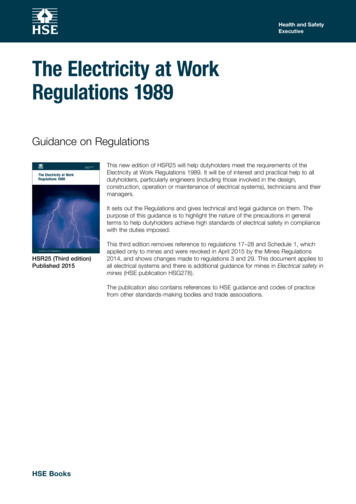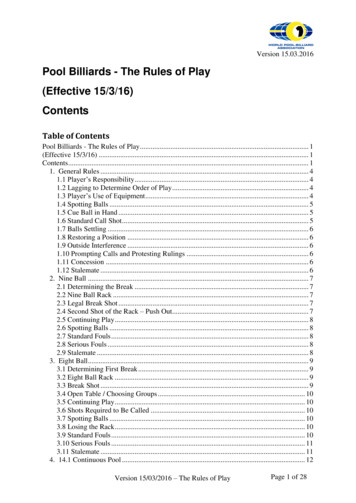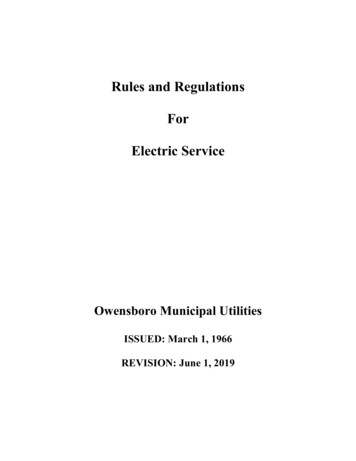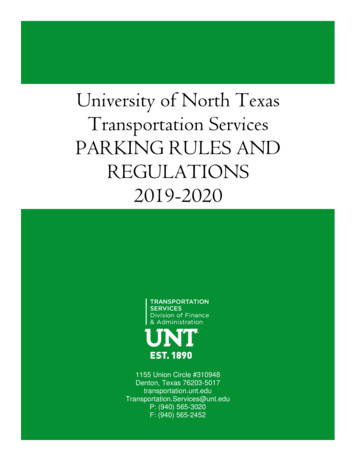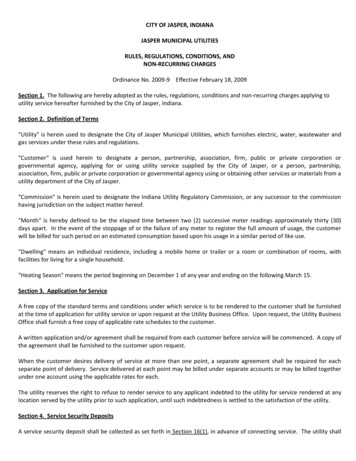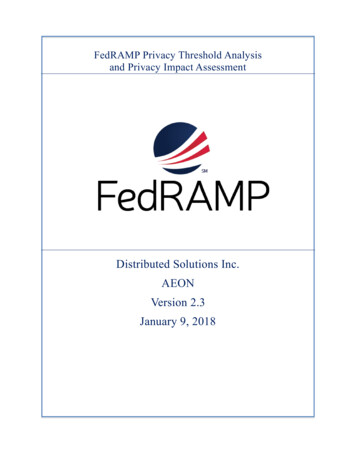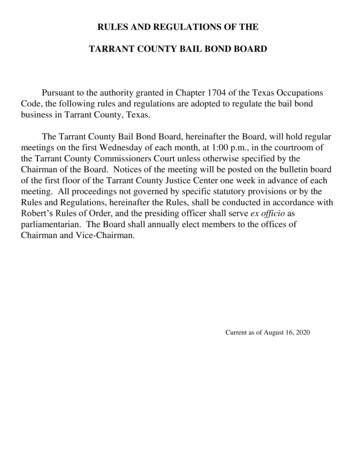
Transcription
RULES AND REGULATIONS OF THETARRANT COUNTY BAIL BOND BOARDPursuant to the authority granted in Chapter 1704 of the Texas OccupationsCode, the following rules and regulations are adopted to regulate the bail bondbusiness in Tarrant County, Texas.The Tarrant County Bail Bond Board, hereinafter the Board, will hold regularmeetings on the first Wednesday of each month, at 1:00 p.m., in the courtroom ofthe Tarrant County Commissioners Court unless otherwise specified by theChairman of the Board. Notices of the meeting will be posted on the bulletin boardof the first floor of the Tarrant County Justice Center one week in advance of eachmeeting. All proceedings not governed by specific statutory provisions or by theRules and Regulations, hereinafter the Rules, shall be conducted in accordance withRobert’s Rules of Order, and the presiding officer shall serve ex officio asparliamentarian. The Board shall annually elect members to the offices ofChairman and Vice-Chairman.Current as of August 16, 2020
1. A bondsman shall not engage in conduct involving dishonesty, fraud, deceit, ormisrepresentation as it relates to his bail bond business.Applications / Renewals2. (a) In discharging its responsibility for reviewing applications and renewals for licenses, theapproach to be taken by the Board is generally to require the applicant or licensee seekingrenewal to have at least 50,000 unencumbered minimum collateral deposit.(b) To satisfy the “documentary evidence” requirement of Texas Occupation Code § 1704.152(a) (4), an individual applicant for a bail bondsman’s license or for approval as a corporate bailbond agent must submit an affidavit that he or she has been continuously employed or selfemployed by a person licensed under Chapter 1704 of the Occupations Code, for at least oneyear of the two years preceding the date of application, excluding annual leave, for not lessthan 30 hours per week, and that he or she has performed duties that encompass all phases ofthe bonding business during this period. An individual applicant employed by another licenseeshall also submit an affidavit containing the same material from the licensee or its corporateagent.3. License renewal requests and 500 fees must be submitted for Board approval at themeeting 60 days prior to the expiration of the license. Renewal applicants under the TexasOccupations Code § 1704.162(e), must file an annual financial report 30 days prior to theanniversary date of the issuance of the applicant’s license for review by the Board.All applications for new licenses or renewals shall be approved or disapproved no laterthan 180 days after submission to the Secretary of the Bail Bond Board. This means that anapplicant shall have no more than a maximum of 180 days from initial submission to providesupplemental or amended information before the Board approves or rejects his application.Once an application has been rejected, a subsequent application shall require payment of theappropriate application fee.4. When a bondsman renews his license and resubmits real property for collateral, the valuemay be determined by submitting the following to the Board: a complete appraisal asdescribed in the Texas Occupations Code § 1704.155 (2)(B)5(a) Whenever a bondsman is required to submit a financial statement, whether annually, aspart of an original application for license, or pursuant to a renewal application, or for any otherreason, the financial statement must be current as of a date which is within thirty days of thedate of its submission to the board’s secretary for the board’s consideration. Such a financialstatement should indicate on its face that it is “current as of [date]”.(b) Bondsmen who meet the statutory criteria for periodic renewal of their licenses everythirty-six months must submit an appraisal for each piece of real property that the bondsmenwishes to pledge as collateral for bail bonds during the period for which he is requesting a2
license renewal. This appraisal shall provide the net value of the property according to acurrent appraisal made by a real estate appraiser who is a member in good standing of anationally recognized professional appraiser society or trade organization that has anestablished code of ethics, educational program, and professional certification program. A“current” appraisal, as the term is used herein, means an appraisal which is current as of a datethat is within ninety days of its date of submission to the board’s secretary for the board’sconsideration.Office Procedures6. A bondsman shall not charge a fee for making a bond in an amount in excess of the amountof the bond.7. A receipt shall be given to the principal or other person on behalf of the principal who givesmoney or property to a bondsman as collateral to secure either the payment of the bond fee orperformance on the bond. If property is given, the receipt shall describe said property,including serial numbers, VIN’s, etc. The receipt shall state whether the collateral is held tosecure the fee, the performance, or both.If the collateral is to be forfeited, the person giving said collateral shall be given ten (10)days notice of said intended forfeiture. The notice shall be sent by certified mail to the lastknown address. The property may be sold for its fair market value and the defendant’s accountcredited for said amount. The defendant or party giving the collateral shall then be notified ofthe account balance and any surplus remitted to the person posting said collateral. Abondsman or attorney may hold collateral in connection with a bail bond for only twopurposes: securing payment of the bond fee and securing the client's appearances in court.Collateral may not be held or forfeited for the violation of any other contractual provisionbetween the surety and the client.8(a) A bondsman shall maintain a file on each principal for whom he writes a bond. The fileshall contain the information required under Chapter 1704 of the Texas Occupations Code.Especially § 1704.202 and § 1704.305 as well as any information required to be maintained bythe local Rules herein.A “file” means a physical file or one electronic file that is accessible upon demand at all timesin a bondsman’s designated office. A “file” as used in this rule does not include data orinformation that is stored elsewhere, such as within computer programs or applications.(b) Within 30 days after initial licensing as a bondsman in Tarrant County or within 30 daysafter the renewal of any license to act as a bondsman issued by the Tarrant County Bail BondBoard, a licensee must submit a written designation to the secretary of the Bail Bond Boardproviding a Tarrant County address at which his bail bond business records shall be kept.These records shall remain accessible at that location to a representative of the Bail Bond3
Board in accordance with the laws of this state and the local rules of this board, unless anduntil the licensee submits an amended designation, in the same manner, stating a differentaddress within the county.(c) For purposes of Texas Occupations Code § 1704.213, an “office” shall mean a designatedstreet address at which a license holder currently maintains and stores all records related to hisor her bail bond business which are required to be kept by statute or local rules and at which alicensee shall be amenable to service of process in connection with his or her bail bond suretybusiness.9. (a) A receipt shall be given to the principal or person paying a bond fee. The receipt muststate whether any money or property provided to the bondsman is intended to pay a bond fee orto be held as collateral. If property is given to a bondsman, a description of such property shallbe included on the receipt, to include serial numbers, if any. A copy of such receipt shall bekept in the file required by Rule No. 8(a).(b) If a bondsman collects money in order to pass any portion of that money on to anyoneelse providing professional service in connection with any person’s arrest, release from jail, orcriminal charges, the bondsman must provide a receipt for these funds to the person providingthe money. The receipt must state the amount of the payment received, the purpose of thepayment, and the name of the service provider who will receive the funds or any portion of thefunds. If funds are collected in order to refer the bond to another bail bond surety in anyjurisdiction, the name of the bail bond surety who will make the bond must be entered on thereceipt, along with a notation stating that the second bail bond surety is intended to be theactual surety on the bail bond. A copy of the receipt must be retained in the file required byRule No. 8 (a) A bondsman’s file should also reflect the method, amount, and date of disbursalfrom the bondsman. Nothing in this rule should be construed to inhibit or prevent fee splittingbetween sureties which is otherwise allowed by law.(c) “A bondsman shall not collect legal fees to pass on to a lawyer. This prohibition applieseven to situations in which the bondsman passes 100% of the amount collected to the lawyer.”(d) Whenever a bondsman holds a corporate agent’s license and an individual bail bondlicense which operate and/or advertise under the same trade name or “business name”, thatbondsman/corporate agent must disclose on each receipt whether the receipt relates to a bondon his corporate license or a bond on his individual license.10. The bondsman has the responsibility of notifying the principal of all court settings. Arecord of such notice shall be kept in the file required by Rule No. 8(a). Such file shall be keptfor a period of one year from the date the bond is discharged.4
A court setting notification must be a written copy of the notice, or a log listing the court dateat issue, who made personal or phone contact, how the contact was made (e.g. left a message,spoke to live person), phone number called (if any) and date and time of contact.11. A bondsman shall not accept as a fee anything of value, for obtaining a writ of habeascorpus on behalf of any person incarcerated in any jail, nor may a bondsman accept any form ofreferral fee from anyone in connection with any writ of habeas corpus which is obtained torelease any inmate from any jail.The normal rule prohibiting referrals to attorneys {Texas Occupation Code Sec. 1704304(a)} applies to referrals in connection with writs of habeas corpus.Advertising12.(a)A licensed bondsman (other than a corporation) may operate under only one“business name”. This “business name” may be an assumed name or the bondsman’s“real” name (individual name).(b) A corporate surety may also operate under an assumed name or under its “realname” (the name of the corporation), as in (a) above. Instead of these alternatives, acorporate surety may choose to operate under the name of any of its licensed corporateagent (but not under the names of anyone licensed only as a Bail Bond Agent). Eachcorporate agent licensed to operate for a corporate surety may operate under only onebusiness name. No more than one corporate agent per corporate surety may operateusing the corporation name as its “business name”. A corporate surety may operateunder only one name for each corporate agent.(c) Each corporate agent and each licensed bondsman (other than a corporation) mustdesignate a “business name” that he or she intends to use whenever a license is obtainedor renewed, or whenever he or she intends to change a “business name” betweenrenewals. The Board may refuse permission to use any name that is confusing ormisleading.(d) A licensed bondsman must advertise under the proper “business name,” as thatterm is defined above. However, all advertisements must also contain any corporatename (if different than “business name”), any corporate agent’s name along with adesignation naming the agent as such, the individual name of any non-corporatebondsman, and the license number which the bondsman operates.” Advertisement”includes billboard, telephone directory ad, newspaper or magazine ad, handbill, businesscard, and any electronic or printed material used to solicit business, including an internetlisting or internet page over which the bondsman has control. Any internet advertisingor internet listing over which the bondsman has control or input must also list theproper business name. An internet listing stating that the bondsman operates in Tarrant5
County must not place the phrase “Tarrant County” in front of the business name.When a bondsman creates an internet listing or web page, this rule is satisfied if anyweb page or listing links to a page containing all the required information listed above.(e) All licensed sureties must be in compliance with Rule 12 (d) from the date of anynew license granted after the passage of Rule 12 (d) or from the date of their first licenserenewals following the Board’s approval of Rule 12 (d). Additionally, all advertisingmaterials ordered or created after the Board’s approval of Rule 12 (d) must comply withRule 12 (d).(f)Bail Bond Agents may not advertise bail bond services in their own names butonly in the name of the business for whom they are agents. They may not, on personalbusiness cards or otherwise, advertise using a phone number that does not belong to alicensed bondsman.13. No soliciting of bonds is permitted inside jail buildings, or at entrances thereto, by eitherlicensed bondsmen or their agents. “Soliciting” as used herein means person to personpetitions or invitations addressed to particular individuals to enter into a bail bond relatedtransaction.Because solicitation of bonds is limited by this rule and by other provisions of the Bail BondAct, licensed sureties shall be prohibited from paying their agents additional compensation forsuccessfully negotiating the acquisition of new or additional bond business.14. (a) No billboard or other type of advertising will be placed in a location where its content isdiscernibly visible by an inmate from inside a jail building as bail bond advertising.(b) Vehicles displaying bail bond advertising should not be parked on public property which isvisible from any entrance to any jail building except for so long as it is necessary for agents oremployees using the vehicles to transact bail bond related business within the jail building.(c) No electronic device disseminating any form of bail bond advertising may be carried orplaced within any jail, courthouse, government building, or on or within any fixture or personalproperty located on any public real property surrounding such a building such as a sidewalk orgovernment right of way.15. If a bondsman purchases a bail bond business and intends to assume the seller’s tradename, or telephone number(s) for any time period whatsoever, the agreement for such sale mustbe presented to the board and approved in order for the purchaser to receive any exemption6
from Local Rule 12. Any purchaser assuming a trade name or telephone number withoutreceiving prior approval from the board shall be considered in violation of Local Rule 12.Collateral16. a. No collateral will be added to a bondsman’s maximum bond amount unless it is aminimum of 1,000.b. If cash or certificate(s) of deposit are offered as collateral, they must remain in trust forat least one year. After the expiration of one year, certificates of deposit pledged as collateralmay be released and substituted without Board approval by the secretary of the Board, providedthat the substituted certificates of deposit are of equal value.c. If real estate is offered as collateral, the real estate may be released within ninety daysprovided that cash or certificate(s) of deposit in equal or greater amount are offered in lieu ofthe real estate. Cash or certificate(s) of deposit offered in place of real estate must remain intrust for one year. Any change in collateral under this rule must be accompanied by a currentfinancial statement.d. If real estate is offered as collateral in lieu of cash or certificate(s) of deposit, or inlieu of other real estate already pledged, or for any real estate offered as collateral, thebondsman must present the following to the Board for approval:1. “property description when real estate is used as surety” affidavit,2. current appraisal, or certified value of the property according to the current taxappraisal rolls, and3. current financial statement. If the bondsman is licensed under §1704.162(e) ofthe Texas Occupations Code and an annual financial report has been filedwithin the last 12 months, no additional financial statement will be requiredunder this Rule.e. When a surety or prospective surety provides real property to collateralize future bailbonds, he or she must elect to value the property via one of two methods: certified property taxappraisal value, or according to an appraisal from a qualified appraiser meeting the standardsset forth in the Bail Bond Act. Once this election is made, the surety cannot change the methodfor valuing the real property collateral until he or she next renews his or her license.17. On or before February 15 of each year, bondsmen with real estate pledged as collateral formaking bail bonds will provide a copy of paid tax receipts for each piece of real estate sopledged. These receipts must show proof of taxes paid in full by no later than the immediatelyprevious January 31, and must show such payment for any county, city, school district andother ad valorem taxes which are due for the previous calendar year. Failure to comply withthis provision will result in the applicable property being immediately deducted from postedcollateral as of February 16 of the applicable year. If a bondsman provides proof that taxes7
were paid in full by January 31, but provides that proof after February 15, any collateralpreviously deducted by the Board’s Secretary shall be immediately restored to the bondsman’saccount without the necessity of further Board action.If, however, a bondsman fails to pay taxes in full by January 31 but makes a laterpayment in full, he must make a request to the Board for reinstatement of collateral. Uponwritten request from a bondsman received ten (10) days before a scheduled monthly meeting ofthe Board, a request to reinstate real estate which has been deducted from posted collateral fornon-payment or late payment of property taxes as stated above shall be placed on the agendafor the Board’s consideration. If the bondsman provides proof at such a meeting that allproperty taxes and penalties have been fully paid as of that time, the real estate shall beimmediately restored to a bondsman’s posted collateral.18. (a) So long as it is pledged as collateral for making bail bonds, property shall not be furtherencumbered nor shall any interest in the property be conveyed to any other legal entitywhatsoever without the express consent of the Tarrant County Bail Bond Board. This ruleapplies equally to all forms of collateral, whether real or personal property.(b) When a certificate of deposit is pledged as collateral for making bail bonds, thebondsman pledging the CD shall execute a document permitting the relevant financialinstitution to confirm the amount, current encumbrance and assignment status of the certificateto any representative of the Tarrant County Auditor, Tarrant County Sheriff’s Department, orTarrant County Bail Bond Board.(c) Bondsmen shall answer all inquiries from Tarrant County agents or employeesconcerning property pledged as collateral. Such an inquiry, made in writing to the latestaddress provided by the bondsman to the County, shall be answered in full within thirty daysafter the inquiry is deposited in the United States Mail via Certified Mail, Return ReceiptRequested.(d) If the value, encumbrance status or assignment status of any collateral remainsunconfirmed after an inquiry as described above in (c), the previously established value of therelevant collateral may be immediately deducted from the amount of collateral used todetermine the maximum amount of bail bonds a bondsman is allowed to maintain at any giventime. Such a deduction shall in no way preclude further discipline against the bondsman whofails to meet his or her obligations under Rule 18 (c).(e) If a bondsman has pledged a CD as collateral, and the financial institution issuing theCD is sold, merges with another financial institution, changes name, or otherwise undergoes achange in form, the bondsman is responsible to notify the Bail Bond Board Secretary within 60days of the change, and to either provide written verification that any assignment of the CDremains valid or to provide a new assignment form reflecting the relevant change to thefinancial institution.8
(f)A bondsman must provide updated information about his or her then-pledged collateralas part of his or her application or annual financial statement.(g) When a CD is pledged as collateral, a bondsman must provide documentation of thelength or term of the CD. A CD will be counted as collateral only until the expiration of itsterm, unless and until the bondsman provides documentation as to the terms of any renewal.Bond Forfeitures19. (a) A bondsman (or attorney making bonds pursuant to Texas Occupations Code§1704.163) must satisfy all requirements of Texas Occupations Code §1704.204. Such a bailbond surety will have bond posting privileges suspended pursuant to Texas Occupations Code§1704.2535 upon notification to the Sheriff’s Office from the District Clerk, County Clerk, orDistrict Attorney’s Office, as an authorized representative of the bail bond board, that theperson has failed to pay a bond forfeiture judgment not later than the 31 st day after finaljudgment in the trial court, deposit cash in the amount of a judgment while the judgment is onappeal, or file a supersedeas bond in the amount of a bond forfeiture judgment which is onappeal.As used in this rule, “final judgment in the trial court” means a judgment pursuant to TexasCode of Criminal Procedure art. 22.14 which is no longer subject to a pending or potentialmotion for new trial.Whenever a bondsman or attorney’s bond posting privileges have been suspended pursuant to§1704.2535 for thirty straight days, the Secretary of the Board shall generate a complaintbefore the Board so that the Board may consider whether to take disciplinary action against thebondsman or attorney.(b) The Tarrant County Bail Bond Board will suspend bond posting privileges of abondsman (or attorney making bonds pursuant to Texas Occupations Code §1704.263)pursuant to Texas Occupations Code §1704.2535 upon notification from a bail bond board orSheriff of another Texas county that the bondsman or attorney has failed to pay a final bondforfeiture judgment in the other Texas county as required by Texas Occupations Code§1704.204.Such suspension shall occur only after the matter has been placed upon the agenda of theTarrant County Bail Bond Board, and after the bondsman or attorney has been given notice ofpossible suspension and an opportunity to be heard on the matter at a meeting of the TarrantCounty Bail Bond Board.9
If the Tarrant County Bail Bond Board finds that the bondsman or attorney has failed to pay afinal bond forfeiture judgment in the other Texas County as required by Texas OccupationsCode §1704.204, it shall suspend the bondsman or attorney’s privilege to post bonds in TarrantCounty until such time that the bondsman or attorney has complied with §1704.204 in theaffected Texas county.(c) A bail bond surety (whether bondsman or attorney) must pay all reasonable andnecessary expenses incurred by any peace officers in re-arresting his or her clients in the eventthat the clients fail to appear before a court or magistrate as specified in their bail bonds.When a surety receives a bill for such re-arrest costs from any sheriff or peace officer, such billmust be paid within thirty days of the date indicated on the letter unless the surety providesproof to the Tarrant County Sheriff that he or she is contesting the expenses in court or that abail bond forfeiture case in connection with the expenses has not yet been finally adjudicated.In the event that there has been no final adjudication of a bail bond forfeiture case inconnection with the expenses, or in the event that the expenses are otherwise contested incourt, the surety must pay any such expenses approved by the court within thirty days of a finaladjudication concerning the expenses.If a surety fails to pay re-arrest expenses in accordance with this rule, he or she will have bondposting privileges suspended in accordance with Texas Occupations Code §1704.2535 by theTarrant County Sheriff until such time as payments are current in compliance with this rule.20. A bail bond surety must pay reasonable and necessary expenses incurred in returning theaccused into the custody of the sheriff of the county in which a prosecution is pending underTexas Code of Criminal Procedure Art. 17.16.When a surety receives a bill for such re-arrest costs from any sheriff or peace officer, such billmust be paid within thirty days of the date indicated on the letter unless the surety providesproof to the Sheriff and the Secretary of the Bail Bond Board within that same time period thathe or she is contesting the expenses before the Tarrant County Bail Bond Board.If a surety fails to pay re-arrest expenses in accordance with this rule and also fails to givetimely notice to the Sheriff and Bail Bond Board Secretary that he is contesting the expensesbefore the Tarrant County Bail Bond Board, he or she will be suspended from the active bondlist by the Tarrant County Sheriff until such time as payments are current in compliance withthis rule.10
When expenses are contested in front of the Bail Bond Board, the Board’s decision shall befinal, and any expenses ruled payable by the Board must be paid within thirty days of theBoard’s decision. When such timely payment is not made by a surety, the surety will besuspended from the active bond list by the Tarrant County Sheriff until such time as paymenthas been made in compliance with this rule.Agents21. When a corporate bail bond agent executes a Tarrant County bond on behalf of corporatesurety, he is responsible for all the company’s obligations to see that notice of future courtsettings is properly conveyed to the corporation’s client, and he must obey all the other rulesand regulations of this board and of the Texas Occupations Code Chapter 1704 in dealing withthis client.a. Bail Bond Agent shall mean any person hired by a bondsman who performs either of thefollowing duties:1. meets and negotiates with members of the public for the purpose of selling bailbonds;2. presents bonds to the Sheriff’s Department or another law enforcement officeror magistrate for approval.b. Removed on June 6, 2017 with the amendment of Rule 21c. The Board will not grant a license or renewal as a Bail Bond Agent to any person who,within the preceding ten years, has been convicted of a misdemeanor involving moral turpitudeor of a felony.In order to facilitate inquiry about this criminal record, an applicant for a Bail Bond Agent’slicense shall provide one set of fingerprints with his or her application. After one set has beenprovided, no additional set will be required for further renewals of the license.An application for a Bail Bond Agent’s license must be personally signed by the bondsmanwishing to employ the applicant as a Bail Bond Agent. A signature stamp will not suffice, norwill anyone signing on the bondsman’s behalf, even with explicit permission of the bondsman.d. No bondsman may employ a person as either a Bail Bond Agent who is not licensed toperform those functions in Tarrant County by the Tarrant County Bail Bond Board.e. Each agent’s license, including renewals, shall be valid for twelve months after approval,unless suspended or revoked by the Board. The Board shall revoke an agent’s license uponwritten request by the Bondsman who is the principal on that license.11
f. Each bondsman may have as many employees licensed as Bail Bond Agents as he or shedesires.g. In order to qualify for a Bail Bond Agent’s license, an applicant must show that he meets allrequirements of the Act and these Rules other than the net worth and collateral necessary forapplicants seeking a bail bondsman’s license. If an applicant appears to have previouslyviolated the Act or these Rules or to have engaged in conduct unbecoming a bondsman, theBoard will not license the applicant as a Bail Bond Agent for any Tarrant County bondsman.Bail Bond Agents shall comply with the Act, and the Rules and Regulations of theTarrant County Bail Bond Board. Upon showing that a Bail Bond Agent has violated either theAct, or the Rules and Regulations, or conduct unbecoming a bondsman, the license(s) for suchagent may be suspended or revoked for each bondsman represented by such agent.h. Each bondsman is responsible for the actions taken by those Bail Bond Agents hired by thebondsman. Upon showing that a Bail Bond Agent has violated the Act or the Rules andRegulations while representing one or more specific bondsman, the license of the bondsmanmay be suspended or revoked.i. An applicant who has been denied a Bail Bond Agent’s license may not reapply for a periodof six months from the date of the denial of his application for license.j. No former bondsman who still has a connected phone number which was previouslyadvertised or published in connection with his or her former bail bond business may act or belicensed as a Bail Bond Agent under another bail bond surety. Any former bondsman whowishes to act as a Bail Bond Agent under another bail bond surety must disconnect (withoutforwarding notice to callers) all phone numbers which were formerly published or advertised inconnection with the bondsman's former license as a bail bond surety.k. Individuals who hold licenses as “Class A” or “Class B” Agents shal
Code, the following rules and regulations are adopted to regulate the bail bond business in Tarrant County, Texas. The Tarrant County Bail Bond Board, hereinafter the Board, will hold regular meetings on the first Wednesday of each month, at 1:00 p.m., in the courtroom of the Tarrant County Commissioners Court unless otherwise specified by the



